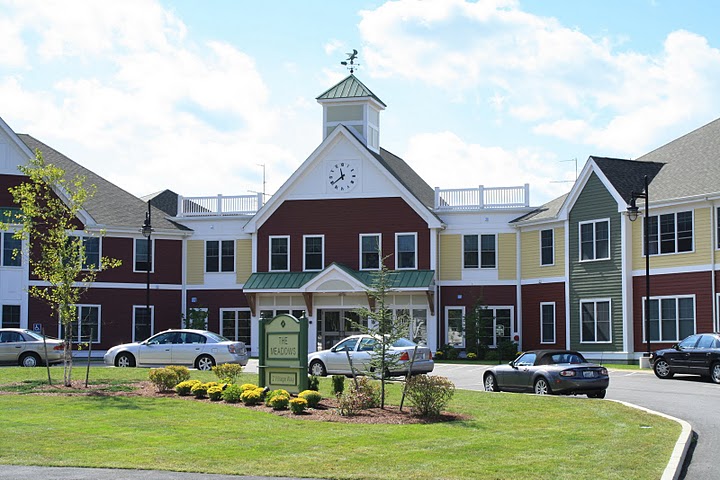NeighborWorks Blackstone River Valley, located in Rhode Island, was an early adopter of geothermal technology. But it wasn't always smooth going, says Christian Caldarone, deputy director. He was forced to get a quick education on geothermal soon after he started his job. The organization used an open-looped system, relying on fresh groundwater to transfer heat, for The Meadows, bright, one- and two-bedroom apartments that look like they're part of a small village.
"We learned that in the Northeast, the soil is not good for an open-looped system," he shares. Sand destroyed pump motors and even a stainless-steel spin-down filter that was supposed to outlive the system. "It was a ticking timebomb," Caldarone says. And because the apartments housed residents over the age of 65, there was even more cause for worry. "We knew we had to figure something out before there was an extreme weather event," he says. And they had plans and back-up plans for the residents in case of a system failure – which never happened.
In the end, the organization needed to convert to a "modified closed loop," which would incorporate dozens of shallow wells and other technology. It cost close to $600,000 in total, because they had to build out an additional mechanical room to house the added equipment.
"We're a NeighborWorks America-certified green organization," Caldarone says. Even so, when looking for a proper fix, they even considered converting back to gas. Fortunately, restructuring the system made the most fiscal sense, especially once NeighborWorks America included NeighborWorks BRV in its portfolio strengthening program.
The program started in 2003, and more than 90 network organizations have particpiated in the program, with a goal of developing a strategic approach for organizations to optimize their rental portfolio, set performance goals at a portfolio level, improve asset values and more., which provides three years of expendable grant funds. The goal is
These grants are intended to implement portfolio strategies by investing in target properties to diminish risk and/or increase opportunities for the long-term sustainability and affordability of the project, and also to allow the properties to lessen the risk and/or provide support to the parent organization. All grantees have completed an intensive portfolio clinic and prepared a three-year plan demonstrating the potential of property and portfolio performance improvements. Typical uses are to reduce debt, invest in energy efficiency, and upgrade the physical plant to improve marketability and/or operations efficiency.
"It was a lifesaver," Caldarone says of the program. "We needed something very specific and the group at NeighborWorks understood this. It gave us the funding to go through this conversion." They completed repairs in 2018. The payback is still years away, Caldarone says, but it will come in time.
He knocks on wood before discussing how the system is doing now. "It's working. Things have been fantastic. It's run to spec."
His advice to others trying this? "Make sure you have a good engineer," he says. Also: "A closed system is better if you live in New England." Communication – making sure you and your technical crew can understand each other – is another essential. Caldarone recommends not only communicating regularly (he checks in with the team at least once a week), but talking about the best way to communicate for all involved. He goes on site whenever he can.
"There's always stuff to learn," he says. "If you're not doing it every day, you don't' remember it – it's like high school French.
NeighborWorks America is working to build the capacity of NeighborWorks network organizations through training, technical assistance and flexible funding to navigate the complexities of the multitude of funding sources and position organizations to access opportunities created through the Inflation Reduction Act (IRA) and beyond. Last year, the organization held a symposium, "Climate Resilience: Fostering Wealth, Health and Sustainability in Communities of Color."
"Geothermal may or may not be the best option for your community. But it's still exciting because it's one of many emerging clean technologies that support climate resilient, healthy homes," says Cormac Malloy, senior manager, training programs.
NeighborWorks has developed several courses surrounding environmental technologies.
A webinar, Revitalizing Communities through Clean Energy and Climate Resilience, Training and Professional Development will be offered as part of the May Virtual Training Institute.
The NeighborWorks Training Institute in Pittsburgh in August will include several climate resilience courses across a number of lines of business, including "Climate Mitigation: A Toolkit for Community Developers," "Taking Green Action in Your Community," and a new course on financing green developments in the Affordable Housing track.
For those unable to attend the NTI, check out the self-guided course "Being Green, Seeing Green: Counseling Clients to Maximize Energy Savings." The goal is to prepare housing counselors and others to be the trusted community navigator clients need for climate resilience.
05/01/2024

